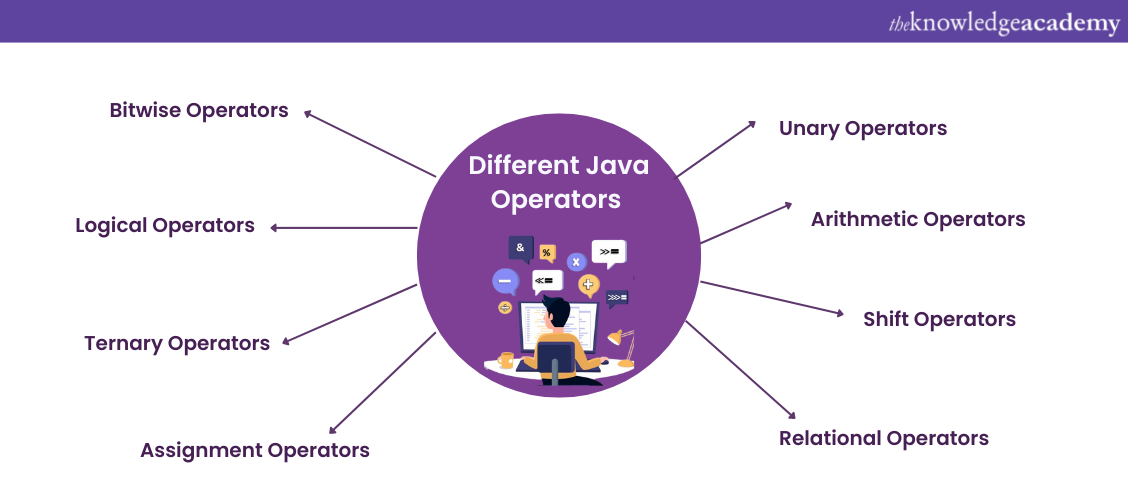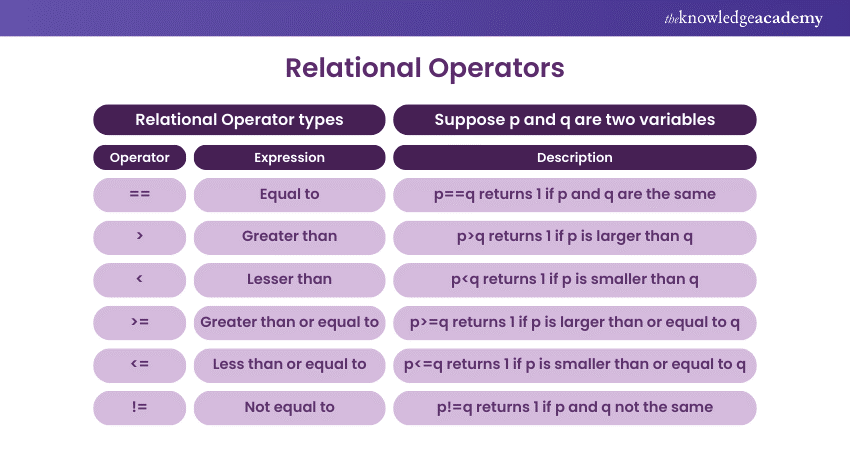We may not have the course you’re looking for. If you enquire or give us a call on 01344203999 and speak to our training experts, we may still be able to help with your training requirements.
We ensure quality, budget-alignment, and timely delivery by our expert instructors.

Java Operators comprise symbols that make the compiler or interpreter perform particular operations like mathematical, relational, or logical ones. Depending on its type, an operator can manipulate an arithmetic and logical value or an operand in a particular way to generate a particular result. Operators in Java play an essential role in handling the simplest arithmetic functions to the execution of complex algorithms.
Table of Contents
1) What are the Java Operators?
1) Different types of Operators in Java
a) Unary Operators
b) Arithmetic Operators
c) Shift Operators
d) Relational Operators
e) Bitwise Operators
f) Logical Operators
g) Ternary Operators
h) Assignment Operators
2) Advantages of Operators in Java
3) Disadvantages of Operators in Java
4) Conclusion
What are the Java Operators?
A set of values in Java can undergo operations using Java Operators, which fall into three categories: unary, binary, and ternary operators. Unary operators involve a single digit, binary operators entail two digits, and ternary operators consist of three digits.
More importantly, Arithmetic Operators in Java are symbols designed to execute operations on variables, facilitating the manipulation of operand values. The diverse Arithmetic Operators in Java serve different purposes in performing various functions.
For instance, the negation operator '!' exemplifies a unary Java operator. On the other hand, subtraction serves as a binary Java operator since it necessitates two operands (a - b), similar to the structure of Binary Options, where two outcomes are possible based on the trade condition. Logical and arithmetic operations play a crucial role in Java Automation Testing when implementing test validations. The sole ternary Java operator is the conditional operator, operating on the if-then-else principle:
(
Learn how to make desktop application and important concept of GUI programming with Java by signing up for our Java Swing Development Training now!
Different types of Operators in Java

Java as a programming language consists of many operators that can be used accordingly when the need arises. The classification or types of operators in Java is based on the functionality they provide. Some of the types of operators are listed and discussed in detail below:
Unary Operators
These operators need only one operand to increase, decrease, and negate a value. The different types of Unary Operators are given below:
a) Unary minus (-): It converts positive values to negative ones.
b) Unary plus (+): This operator indicates the positive value (by default, the numbers are positive without this sign). An automatic conversion to int is performed by this operator when the operand type is byte, char, or short. This is termed as a unary numeric promotion. Similarly, in control flow structures like Switch Case in Java, the type of the expression is also promoted to an integer, enabling more efficient decision-making based on different data types.
c) Increment Operator (++): It is an operator that is used to increase the value by one. There are two types of increment operators.
Post-Increment: It is used for computing first, and the result is then incremented.
Pre-Increment: The value is first incremented, and the result is then computed.
d) Decrement Operator (--): It is an operator that is used to decrease the value by one. There are two types of increment operators.
Post-Increment: It is used for computing first, and the result is then decremented.
Pre-Increment: The value is first decremented, and the result is then computed.
e) Logical Not Operator (!): This operator is used for inverting a Boolean value.
Arithmetic Operators
Arithmetic Operators are used for computing mathematical expressions, utilizing two operands to perform arithmetic operations on primitive data types. The different types of Arithmetic Operators are discussed below, which can be particularly useful in applications such as Menu Driven Programs in Java.
a) Addition (+): It adds operands on either side of the operator.
b) Subtraction (-): It subtracts the right-hand operand from the left-hand operand.
c) Multiplication (*): It multiplies operands on either side of the operator.
d) Division (/): It divides the left-hand value by the right-hand value and gives the result as a quotient.
e) Modulus (%): This operator also divides the left-hand value and the right-hand value, but the difference to the division operator is that it returns the result as a remainder.
Learn how to make desktop application and important concept of GUI programming with Java by signing up for our Java Swing Development Training now!
Shift Operators
This type of operator is used to shift the bits of a number to the left or right, resulting in the multiplication or division of the number by two, respectively. Different types of shift operators are discussed below:
a) Left shift operator (<<): This operator shifts the bits of the number to the left, and as a result, fills the voids left with zeros. The effects are similar to multiplying the number by a power of two, which can also be demonstrated in a Bubble Sort Program in Java when adjusting element positions in an array.
b) Signed Right shift operator (>>): This operator moves some of the numbers to the right and, as a result, fills up zero as a value on the voids left. The leftmost bit is dependent on the sign of the initial number. The effects are similar when dividing the number with some power of two.
c) Unsigned Right shift operator (>>>>): This operator moves some of the numbers to the right and, as a result, fills up zero as a value on the voids left. The leftmost bit is set to 0.
Relational Operators

Relational Operators are needed to check for relations like equal-to, greater than, or less than. The result after the comparison is generally a Boolean value, and these operators are used in looping statements, conditional if-else statements, and even in conjunction with subordinating conjunctions, which help connect clauses based on certain conditions. with the Jump Statement in Java. Some of the relational operators are discussed below:
a) Equal to (==): It evaluates if the expression on the left side is equal to the right side.
b) Not Equal to (!=): This operator will evaluate to true if the expression on the left-hand side is equal to the right-hand side.
c) Less than (<): It evaluates to true if the left-hand side of the equation is less than the right-hand side.
d) Less than or equal to (<=): It evaluates to true if the left-hand side of the equation is less than or equal to the right-hand side.
e) Greater than (>): It evaluates to true if the left-hand side of the equation is greater than the right-hand side.
f) Greater than or equal to (>=): It evaluates to true if the left-hand side of the equation is greater than or equal to the right-hand side.
Bitwise Operators
Java has several Bitwise operators that work on bits and perform bit-by-bit operations. These operators are applied to the integer types long, short, int, char, and byte. The following Bitwise operators are discussed below:
1) Bitwise AND (&): This operator works by copying a bit to the result if it exists in both operands.
2) Bitwise OR (|): This operator works by copying bit by bit to the result if it exists in either of the operands.
3) Bitwise XOR (^): This operator works by copying bit by bit, if it is set in one operand but not both
4) Bitwise Compliment (~): This operator has the effect of flipping bits as the Binary Ones Complement Operator is unary.
Want to get an understanding and develop your knowledge on the working of Java EE APIs, then signup for our Introduction To Java EE Training course now!
Logical Operators
Logical Operators in Java are used to perform "Logical AND" and "Logical OR" operations, similar to an AND gate and OR gate in digital electronics. It is used extensively to test several conditions before coming to a decision. The different Logical Operators are:
a) Logical AND (&&): This operator outputs a True only if both conditions are true.
b) Logical OR (||): This operator outputs a True if at least one or both conditions are true.
c) Logical NOT (!): When a condition is False, this operator returns True and vice versa.
Ternary Operators
This Java operator is an alternative version of the "if-else" statement with three operands, which is why the name ternary is given to it. The general format is represented by:
Condition ? If true : if false
The above format means that if the condition is true, the statement after the '?' is executed, or else the statement after the ':' is executed.
Prepare for your Java interview with these top Java Interview Questions and Answers. Download now and start practicing!
Assignment Operators
The function of the Assignment operator is to assign a value to any variable that is defined. It has associativity from right to left, where a value present on the right-hand side of the operator is allocated to the variable on the left, a concept that has remained consistent throughout the history and evolution of Java. In several cases, the assignment operator can be combined with different operators, resulting in a shorter statement version. For instance, in the Fibonacci Series in Java, assignment operators play a key role in iterative and recursive calculations, showcasing their practical application.
a) +=: It is used for adding the left operand to the right operand and then assigning the value to the variable on the left.
b) -=: It is used for subtracting the right operand from the left one and then assigning the value to the variable on the left.
c) *=: It is used for multiplying the left operand with the right one and then assigning the value to the variable on the left.
d) /=: It is used to divide the left operand by the right operand and then assign the quotient value to the variable on the left.
e) %=: It is used for dividing the left operand to the right operand and then assigning the value of the remainder to the variable on the left.

Advantages of Operators in Java
Operators in Java offer numerous advantages, enhancing the language's functionality and expressiveness. They facilitate arithmetic operations, enabling the manipulation of numeric data with ease.
Moreover, logical operators aid in creating conditional statements, pivotal for decision-making in programs. Relational operators compare values, supporting the formulation of meaningful comparisons in control structures.
Assignment operators streamline variable assignments, promoting concise code. Bitwise operators enable efficient manipulation of individual bits in binary data. Moreover, Java boasts the ternary operator for concise conditional expressions, a concept often explained in Java Books.
Collectively, these operators empower developers to write efficient, readable, and expressive code, fostering the creation of robust and dynamic Java applications.
Master Java faster – get your Java Cheat Sheet now!
Disadvantages of Operators in Java
The drawbacks of Java Operators stem from their essential role in executing operations. Primarily, the potential for unintended side effects arises due to the direct modification of variables, introducing challenging-to-trace bugs.
Furthermore, operator overloading may lead to ambiguity and compromise code readability. Precision problems can occur in complex mathematical computations, affecting result accuracy. The increment/decrement operators can create post or pre-increment pitfalls, impacting program logic. Lastly, misuse of bitwise operators, particularly by those unfamiliar with their intricacies, may yield unexpected outcomes, introducing potential vulnerabilities.
Overall, while operators are crucial, understanding their nuances and potential pitfalls is vital to writing robust and bug-free Java code.
Download the Java Cheat Sheet and code with confidence!
Conclusion
After reading this blog, you will be aware of the types of Java Operators that are present and learn how to use each of these operators to evaluate arithmetic or logical functions. Additionally, understanding how the Delegation Event Model in Java integrates with Java Operators can help streamline event-handling processes in GUI applications.
Learn to develop, understand and implement JavaScript with HTML by signing up for our JavaScript For Beginners Course now!
Frequently Asked Questions
What are operators in Java with an example?

Operators in Java are symbols used to perform operations on variables and values. They can be arithmetic, relational, logical, bitwise, and more. For example,
int num1 = 5;
int num2 = 10;
int sum = num1 + num2; // sum will be 15
What does the – operator do in Java?

In Java, the "-" operator is used for subtraction. It subtracts the value on the right side of the operator from the value on the left side. For example,
int num1 = 10;
int num2 = 5;
int difference = num1 - num2; // difference will be 5
What is Knowledge Pass, and how does it work?

The Knowledge Academy’s Knowledge Pass, a prepaid voucher, adds another layer of flexibility, allowing course bookings over a 12-month period. Join us on a journey where education knows no bounds.
What are related Courses and blogs provided by The Knowledge Academy?

The Knowledge Academy offers various Java Courses, including Java Programming, JavaScript for Beginners, Hibernate Training and more. These courses cater to different skill levels, providing comprehensive insights into What is Bootstrap.
Our Programming and DevOps Blogs cover a range of topics related to Java, offering valuable resources, best practices, and industry insights. Whether you are a beginner or looking to advance your Programming and DevOps Skills, The Knowledge Academy's diverse courses and informative blogs have you covered.
What are the other resources provided by The Knowledge Academy?

The Knowledge Academy takes global learning to new heights, offering over 3,000 online courses across 490+ locations in 190+ countries. This expansive reach ensures accessibility and convenience for learners worldwide.
Alongside our diverse Online Course Catalogue, encompassing 19 major categories, we go the extra mile by providing a plethora of free educational Online Resources like News updates, Blogs, videos, webinars, and interview questions. Tailoring learning experiences further, professionals can maximise value with customisable Course Bundles of TKA.
Upcoming Programming & DevOps Resources Batches & Dates
Date
 Java Programming
Java Programming
Mon 12th May 2025
Mon 14th Jul 2025
Mon 22nd Sep 2025
Mon 17th Nov 2025






 Top Rated Course
Top Rated Course


 If you wish to make any changes to your course, please
If you wish to make any changes to your course, please


